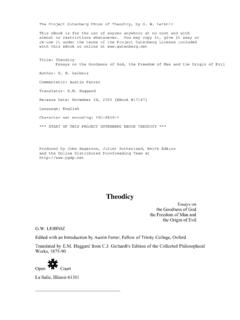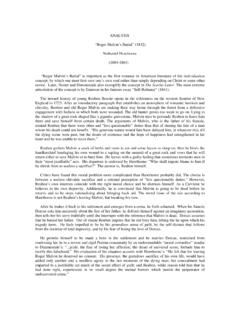Transcription of The Dawkins Confusion - philvaz.com
1 [ Click to print | Close window ] The Dawkins Confusion Naturalism ad absurdum. by Alvin Plantinga Richard Dawkins is not pleased with God: The God of the Old Testament is arguably the most unpleasant character in all of fiction. Jealous and proud of it; a petty, unjust unforgiving control-freak; a vindictive, bloodthirsty ethnic-cleanser; a misogynistic homophobic racist, infanticidal, genocidal, filicidal, pestilential, Well, no need to finish the quotation; you get the idea. Dawkins seems to have chosen God as his sworn enemy. (Let's hope for Dawkins ' sake God doesn't return the compliment.) The God Delusion is an extended diatribe against religion in general and belief in God in particular; Dawkins and Daniel Dennett (whose recent Breaking the Spell is his contribution to this genre) are the touchdown twins of current academic Dawkins has written his book, he says, partly to encourage timorous atheists to come out of the closet.
2 He and Dennett both appear to think it requires considerable courage to attack religion these days; says Dennett, "I risk a fist to the face or worse. Yet I persist." Apparently atheism has its own heroes of the faith at any rate its own self-styled heroes. Here it's not easy to take them seriously; religion-bashing in the current Western academy is about as dangerous as endorsing the party's candidate at a Republican rally. Dawkins is perhaps the world's most popular science writer; he is also an extremely gifted science writer. (For example, his account of bats and their ways in his earlier book The Blind Watchmaker is a brilliant and fascinating tour de force.) The God Delusion, however, contains little science; it is mainly philosophy and theology (perhaps "atheology" would be a better term) and evolutionary psychology, along with a substantial dash of social commentary decrying religion and its allegedly baneful effects.
3 As the above quotation suggests, one shouldn't look to this book for evenhanded and thoughtful commentary. In fact the proportion of insult, ridicule, mockery, spleen, and vitriol is astounding. (Could it be that his mother, while carrying him, was frightened by an Anglican clergyman on the rampage?) If Dawkins ever gets tired of his day job, a promising future awaits him as a writer of political attack ads. Now despite the fact that this book is mainly philosophy, Dawkins is not a philosopher (he's a biologist). Even taking this into account, however, much of the philosophy he purveys is at best jejune. You might say that some of his forays into philosophy are at best sophomoric, but that would be unfair to sophomores; the fact is (grade inflation aside), many of his arguments would receive a failing grade in a sophomore philosophy class. This, combined with the arrogant, smarter-than-thou tone of the book, can be annoying.
4 I shall put irritation aside, however and do my best to take Dawkins ' main argument seriously. The following article is located at: The God Delusion by Richard Dawkins Houghton Mifflin 416 pp., $27 Chapter 3, "Why There Almost Certainly is No God," is the heart of the book. Well, why does Dawkins think there almost certainly isn't any such person as God? It's because, he says, the existence of God is monumentally improbable. How improbable? The astronomer Fred Hoyle famously claimed that the probability of life arising on earth (by purely natural means, without special divine aid) is less than the probability that a flight-worthy Boeing 747 should be assembled by a hurricane roaring through a junkyard. Dawkins appears to think the probability of the existence of God is in that same neighborhood so small as to be negligible for all practical (and most impractical) purposes. Why does he think so?
5 Here Dawkins doesn't appeal to the usual anti-theistic arguments the argument from evil, for example, or the claim that it's impossible that there be a being with the attributes believers ascribe to So why does he think theism is enormously improbable? The answer: if there were such a person as God, he would have to be enormously complex, and the more complex something is, the less probable it is: "However statistically improbable the entity you seek to explain by invoking a designer, the designer himself has got to be at least as improbable. God is the Ultimate Boeing 747." The basic idea is that anything that knows and can do what God knows and can do would have to be incredibly complex. In particular, anything that can create or design something must be at least as complex as the thing it can design or create. Putting it another way, Dawkins says a designer must contain at least as much information as what it creates or designs, and information is inversely related to probability.
6 Therefore, he thinks, God would have to be monumentally complex, hence astronomically improbable; thus it is almost certain that God does not exist. But why does Dawkins think God is complex? And why does he think that the more complex something is, the less probable it is? Before looking more closely into his reasoning, I'd like to digress for a moment; this claim of improbability can help us understand something otherwise very perplexing about Dawkins ' argument in his earlier and influential book, The Blind Watchmaker. There he argues that the scientific theory of evolution shows that our world has not been designed by God or anyone else. This thought is trumpeted by the subtitle of the book: Why the Evidence of Evolution Reveals a Universe without Design. How so? Suppose the evidence of evolution suggests that all living creatures have evolved from some elementary form of life: how does that show that the universe is without design?
7 Well, if the universe has not been designed, then the process of evolution is unguided, unorchestrated, by any intelligent being; it is, as Dawkins suggests, blind. So his claim is that the evidence of evolution reveals that evolution is unplanned, unguided, unorchestrated by anyintelligent being. But how could the evidence of evolution reveal a thing like that? After all, couldn't it be that God has directed and overseen the process of evolution? What makes Dawkins think evolution is unguided? What he does in The Blind Watchmaker, fundamentally, is three things. First, he recounts in vivid and arresting detail some of the fascinating anatomical details of certain living creatures and their incredibly complex and ingenious ways of making a living; this is the sort of thing Dawkins does best. Second, he tries to refute arguments for the conclusion that blind, unguided evolution could not have produced certain of these wonders of the living world the mammalian eye, for example, or the wing.
8 Third, he makes suggestions as to how these and other organic systems could have developed by unguided evolution. Suppose he's successful with these three things: how would that show that the universe is without design? How does the main argument go from there? His detailed arguments are all for the conclusion that it is biologically possible that these various organs and systems should have come to be by unguided Darwinian mechanisms (and some of what he says here is of considerable interest). What is truly remarkable, however, is the form of what seems to be the main argument. The premise he argues for is something like this: 1. We know of no irrefutable objections to its being biologically possible that all of life has come to be by way of unguided Darwinian processes; and Dawkins supports that premise by trying to refute objections to its being biologically possible that life has come to be that way.
9 His conclusion, however, is 2. All of life has come to be by way of unguided Darwinian processes. It's worth meditating, if only for a moment, on the striking distance, here, between premise and conclusion. The premise tells us, substantially, that there are no irrefutable objections to its being possible that unguided evolution has produced all of the wonders of the living world; the conclusion is that it is true that unguided evolution has indeed produced all of those wonders. The argument form seems to be something like We know of no irrefutable objections to its being possible that p; Therefore p is true. Philosophers sometimes propound invalid arguments (I've propounded a few myself); few of those arguments display the truly colossal distance between premise and conclusion sported by this one. I come into the departmental office and announce to the chairman that the dean has just authorized a $50,000 raise for me; naturally he wants to know why I think so.
10 I tell him that we know of no irrefutable objections to its being possible that the dean has done guess is he'd gently suggest that it is high time for me to retire. Here is where that alleged massive improbability of theism is relevant. If theism is false, then (apart from certain weird suggestions we can safely ignore) evolution is unguided. But it is extremely likely, Dawkins thinks, that theism is false. Hence it is extremely likely that evolution is unguided in which case to establish it as true, he seems to think, all that is needed is to refute those claims that it is impossible. So perhaps we can think about his Blind Watchmaker argument as follows: he is really employing as an additional if unexpressed premise his idea that the existence of God is enormously unlikely. If so, then the argument doesn't seem quite so magnificently invalid. (It is still invalid, however, even if not quite so magnificently you can't establish something as a fact by showing that objections to its possibility fail, and adding that it is very probable.)





